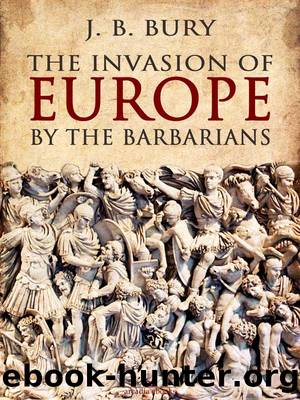The Invasion of Europe by the Barbarians by J. B. Bury

Author:J. B. Bury
Language: eng
Format: epub
Publisher: J. B. Bury
Published: 2016-12-08T16:00:00+00:00
Chapter Ten
Decline of the Roman Power in the West
The collapse of the Huns at the battle of Nedao (A.D. 454) was immediately followed by the settlement of the Ostrogoths in Pannonia, from which they were soon to repeat, in some sort, the part of their old brethren the Visigoths and assist in the disintegration of Roman dominion. The Gepids established their kingdom in Dacia, and we may mark this as the fifth stage in the history of that country, which had been successively submitted to the Dacians, the Romans, the Visigoths, the Huns, and now the Gepids. The Rugians, another East German people, settled along the Danube, probably between Linz and Vienna.
The forty years succeeding the collapse of the Empire of the Huns, from about 454 to 493, were marked by the gradual advance of the German power in Gaul and Spain; while before 493 Italy itself had become a German kingdom. Now the steady increase of the barbarian power, and the steady decline of the imperial power, in the west during these years was largely conditioned (as was noted in an earlier chapter) by the existence and hostility of the Vandal power in north Africa. The Vandal king Gaiseric had formed a strong fleet with which he was able to attack and plunder Italy, as well as to occupy Sicily and Sardinia. I may here make a remark on the general significance of the Vandals in European history. Their kingdom lasted for just a hundred years. Then it was reconquered by the Empire, and the Vandal name disappeared from among the nations. What, then, was the historical significance of this people? Apart from devastation and destruction, what did they contribute, did they contribute anything, towards the permanent shaping of Europe? The destinies of Spain were not seriously affected by their settlement, which in the case of that country amounted to little more than a transit. The fortunes of Spain could not have been very different if the Vandals had never set foot in the peninsula. Nevertheless I conceive that the Vandals were an important factor, though they built up no abiding kingdom. Their occupation of Africa; the strong and formidable, though only temporary power which Gaiseric established at Carthage, supported by the sea-power which he organised in the Mediterranean — these were circumstances of inestimable consequence for the development of events in Europe. The presence of this enemy in Africa — and Gaiseric proved an enemy more irreconcilable than any other German foe — immeasurably weakened the Roman power in all the western provinces. It had the direct result of controlling the corn supply of Italy, and it prevented the Roman government from acting with effectual vigour in either Gaul or Spain. If the Romans had continued to hold Africa — if the Vandals had not been there — there can be little doubt that the imperial power would have maintained itself for a far longer period in Italy, and would have offered far more effective opposition to the expansion of the Germans in Gaul and Spain.
Download
This site does not store any files on its server. We only index and link to content provided by other sites. Please contact the content providers to delete copyright contents if any and email us, we'll remove relevant links or contents immediately.
The Daily Stoic by Holiday Ryan & Hanselman Stephen(2709)
The Fate of Rome: Climate, Disease, and the End of an Empire (The Princeton History of the Ancient World) by Kyle Harper(2436)
People of the Earth: An Introduction to World Prehistory by Dr. Brian Fagan & Nadia Durrani(2346)
Ancient Worlds by Michael Scott(2103)
Babylon's Ark by Lawrence Anthony(2070)
Foreign Devils on the Silk Road: The Search for the Lost Treasures of Central Asia by Peter Hopkirk(2056)
India's Ancient Past by R.S. Sharma(1988)
MOSES THE EGYPTIAN by Jan Assmann(1973)
The Complete Dead Sea Scrolls in English (7th Edition) (Penguin Classics) by Geza Vermes(1842)
Lost Technologies of Ancient Egypt by Christopher Dunn(1798)
The Daily Stoic by Ryan Holiday & Stephen Hanselman(1770)
The Earth Chronicles Handbook by Zecharia Sitchin(1744)
24 Hours in Ancient Rome by Philip Matyszak(1678)
Alexander the Great by Philip Freeman(1650)
Aztec by Gary Jennings(1545)
The Nine Waves of Creation by Carl Johan Calleman(1520)
Curse Tablets and Binding Spells from the Ancient World by Gager John G.;(1510)
Before Atlantis by Frank Joseph(1484)
Earthmare: The Lost Book of Wars by Cergat(1469)
